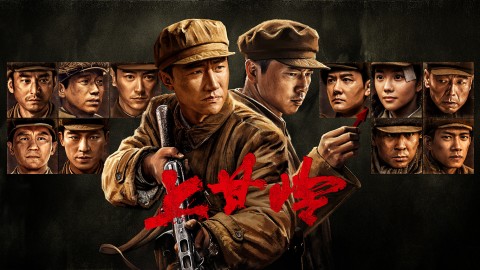The original title of this article was "Both "The Lonely Warrior": The Movie Makes Big Money, and the TV Series Leaves a Lasting Legacy," fortunately, it was not yet written. After watching more than ten episodes, I reluctantly admit that my enthusiasm for following t
Initially, I thought I would support the TV series version of "The Lonely Warrior" as being better than the movie adaptation, but I have changed my mind. In comparison, the movie version is somewhat superior because the TV series version of "The Lonely Warrior" has four major flaws. The TV adaptation of "The Lonely Warrior" has made some clumsy changes in the aspect of the collective pursuit and escape, especially the design of the characters opening a barbecue stall together, which is clearly less organized and visually appealing compared to the movie version.
The movie version even specifically designed a scene where "The Lonely Warrior" collectively rescues abducted children, showcasing their enduring fighting skills. Unfortunately, the TV series version of "The Lonely Warrior" did not have such a highlight. In this regard, the TV series failed to handle the character Cheng Bing's role properly. Most of the time, Cheng Bing seems to have no job and spends his days like an ordinary policeman, conducting investigations. In Northeast China, he lives in a hotel and spends money without earning any. Besides the money he earns from the barbecue stall, his only sources of income are either the "case funds" provided by Cai Bin or the money left by Pan Da Hai.
Clearly, the TV series version of "The Lonely Warrior" fails to portray Cheng Bing's solo pursuit and escape in a down-to-earth manner, unlike the original story and the movie version, which were more realistic and believable. Fortunately, in the final stages of "The Lonely Warrior," the screenwriter finally has Cheng Bing engaging in courier work, security guard duties, and water delivery. It's a pity that it happened so late.
In the TV series version of "The Lonely Warrior," Cheng Bing is still connected to the police and has more interactions with them. On the one hand, it is because of Lin Ying's presence, and Pan Da Hai is aware of Cheng Bing's actions. On the other hand, Pan Da Hai has also shared information with Cheng Bing, and there is cooperation between the two parties.
This design is not particularly clever. First of all, it makes Pan Da Hai and Lin Ying violate work discipline. Even if they are cooperating with Cheng Bing and have good intentions, they have indeed disclosed work-related information to non-police personnel. Secondly, this design makes Cheng Bing's pursuit and escape less pure, diminishing the spirit of dedication and silent struggle portrayed in the original story and the movie version.
However, even after several years of pursuing and escaping, Cheng Bing's daughter still misses her father. Although the movie does not reveal the subsequent plot, through the detail of the daughter sending Cheng Bing a family photo and wishing him a safe return home, we know that after completing his pursuit and escape, Cheng Bing will return to his happy family and embrace a better life.
Audiences not only admire Cheng Bing for his deeds but also hope for a happy ending for him, whether it's in his pursuit and escape or in his family life. This is a common sentiment for people, and in fact, many viewers feel relieved when they learn that Cheng Bing has remarried. The most dislikable aspect of the TV series version of "The Lonely Warrior" is that Cheng Bing simply loses his original family. When many viewers learn that Liu Wen Fang has remarried and has a son, they can't help but sigh.
Cheng Bing's daughter, Cheng Siyuan, has become the focus of criticism for many viewers. Setting aside factors such as acting skills, this daughter repeatedly hurts Cheng Bing and her attitude becomes increasingly disrespectful. She completely fails to understand why her father went to prison. Audiences can forgive her once for being willful, and they can understand it twice, but her repeated willfulness becomes unreasonable.
Undoubtedly, the TV series version of "The Lonely Warrior" spans 24 episodes, and it is necessary to introduce new characters and plotlines. However, the systematic and extensive changes made to the original story may not necessarily be the best choice. At least from the feedback of the audience, the TV series adaptation of "The Lonely Warrior" is not as successful as the movie version.


